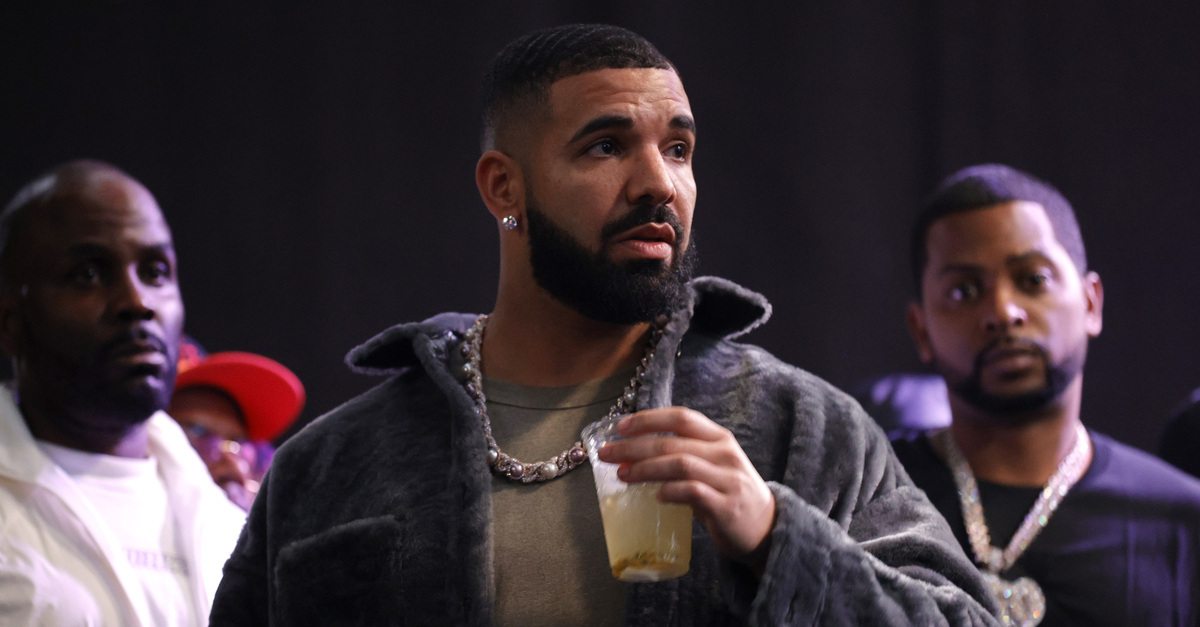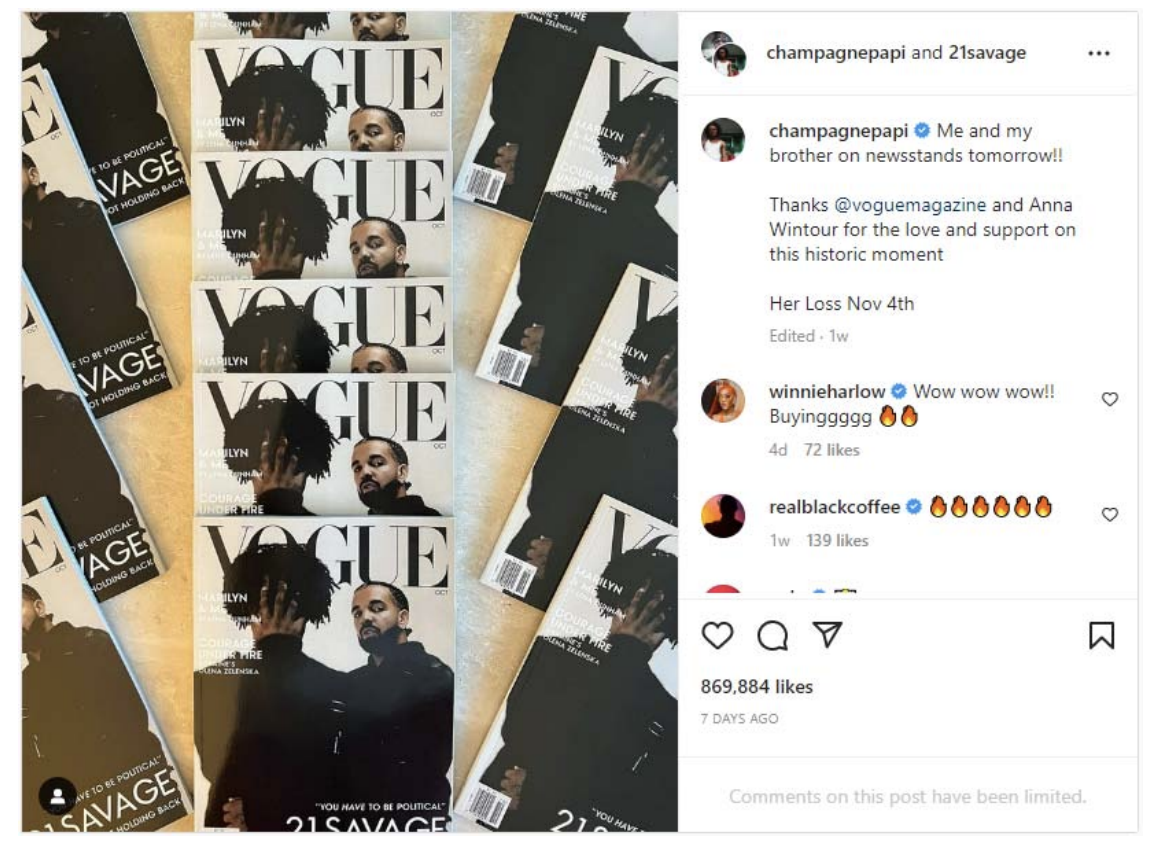
Drake attends Drake’s Till Death Do Us Part rap battle on October 30, 2021 in Long Beach, California.
Hip-hop mogul, actor, and television producer Aubrey Drake Graham, who goes by his middle name professionally, and fellow rapper, Sheyaa Bin Abraham-Joseph, whose stage name is 21 Savage, were sued in a New York City federal court on Monday over part of the promotional advertising for their latest album, Her Loss.
Filed in the Southern District of New York by Advance Magazine Publishers Inc., more commonly known as Condé Nast, the 30-page lawsuit alleges trademark infringement, dilution, unfair competition, and various Empire State law claims over a Vogue magazine mock-up cover featuring both rappers striking a pose.
“Me and my brother on newsstands tomorrow!!” Drake posted on his Instagram – along with a cascading image showing multiple copies of the mock-up. “Thanks @voguemagazine and Anna Wintour for the love and support on this historic moment. Her Loss Nov 4th.”
“Vogue magazine and its Editor-in-Chief Anna Wintour have had no involvement in Her Loss or its promotion, and have not endorsed it in any way,” the lawsuit says. “Nor did Condé Nast authorize, much less support, the creation and widespread dissemination of a counterfeit issue of Vogue, or a counterfeit version of perhaps one of the most carefully curated covers in all of the publication business.”

Drake’s Instagram post as cited in the lawsuit.
The publishing giant’s lawyers complain that the marketing campaign constitutes both “false advertising” and a “flagrant infringement” of the company’s trademark rights that knowingly “underscores the tremendous value that a cover feature in Vogue magazine carries.”
Drake and 21 Savage have also pulled related stunts to promote their latest release – posting about a fake NPR Tiny Desk concert as well as a fake interview with radio personality Howard Stern. Both NPR and Stern, however, took the Her Loss campaign in stride.
The lawsuit goes on to allege that “the rollout of this false campaign deliberately mimicked the promotional activities undertaken and encouraged by Condé Nast in advance of the release of each issue of Vogue” and claims that “confusion among the public is unmistakable,” a necessary claim for a plaintiff to make in a trademark lawsuit.
What’s more, the lawsuit claims, the faux Vogue was actually distributed at various locations in the Big Apple.
“A review of the Counterfeit Magazine itself reveals that it is a complete, professionally reprinted reproduction of the October issue of Vogue, with unauthorized adaptations made in service of promoting Defendants’ Album,” the lawsuit alleges – including several images from inside the purported fake issue. “Some pages have no modifications, constituting an exact reproduction of Condé Nast’s copyrightable content. Other pages are modified to superimpose promotional logos for Defendants’ Album. Others include images of Anna Wintour that were not in the real issue, and in one case was doctored to interpose an image of Drake.”
The lawsuit also names Hiltzik Strategies, Drake’s public relations agency, over their role in the promotional campaign. The filing singles out a “Twitter account associated with Drake” for tweeting out images of the false Vogue issue and for sharing locations where physical copies of the magazine were handed out by members of Drake’s street team in New York City and Los Angeles.
A Twitter post cited in the lawsuit.
“Posts on social media propagated, showing copies of the Counterfeit Magazine that individuals had procured,” the lawsuit adds.
The filing alleges a litany of damages – in excess of $4 million – and requested corrective action from the courts:
Defendants’ use of the VOGUE Mark was willfully intended to trade on the recognition of the famous VOGUE Mark and/or willfully intended to harm the reputation of the famous VOGUE Mark, such that Condé Nast is entitled to recovery of Defendants’ profits and Plaintiff’s damages…Defendants’ infringements have caused, and unless restrained by this Court will continue to cause, immediate and irreparable injury to Condé Nast’s property and business, entitling Condé Nast to injunctive relief (15 U.S.C. § 1116), including, without limitation, an order directing the removal and destruction of all physical copies of the Counterfeit Cover and Counterfeit Magazine.Defendants’ intentional, deliberate, and willful use of the VOGUE Mark and colorable imitations thereof in connection with the Counterfeit Cover, Counterfeit Magazine and Album, with knowledge of Condé Nast’s rights in the registered VOGUE Mark, renders this case exceptional, entitling Condé Nast to an award of reasonable attorneys’ fees incurred in connection with this action.
Law&Crime reached out to Drake and 21 Savage for comment on this story but no response was immediately forthcoming at the time of publication.
[featured image via Amy Sussman/Getty Images; inline images via SDNY]